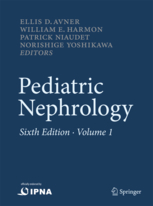|
|
|
| |
 |
|
|

|
 推薦指數:
推薦指數:





|
|
- 內容介紹
|
Pediatric Nephrology (2 Vol Set)
Avner, E.D.; Harmon, W.E.; Niaudet, P.; Yoshikawa, N. (Eds.)
Original published by Lippincott Williams & Wilkins
6th ed., 2009, XXIV, 2035 p. 600 illus., 50 in color.
978-3-540-76327-7
Now in its 6th edition, Pediatric Nephrology has earned its place as the standard reference in its field
Well-structured, reader-friendly text covers all clinically relevant aspects of congenital and acquired pediatric kidney diseases
Includes up-to-date treatment guidelines based on newest research findings
Offers extensive clinical algorithms to improve understanding of kidney disease and to guide the most appropriate treatment
Each chapter has not only been completely rewritten and updated but includes approximately 40% of entirely new material
Through 5 editions, Pediatric Nephrology has become the standard reference text for students, trainees, practicing physicians (Pediatricians, Nephrologists, Internists, and Urologists), sub-specialists, and allied health professionals seeking information about Children’s Kidney Diseases. It is global in perspective and reflects the international group of editors, who are well-recognized world’s experts in Pediatric Nephrology. In a single text, the development of kidney structure and function is followed by detailed and comprehensive chapters on all childhood kidney diseases. These chapters, grouped by major disease categories, utilize molecular and cellular pathophysiology of disease to provide unique and comprehensive information of the current state of the art on all known childhood kidney diseases. Each chapter makes new genetic information easily understandable for the practitioner, and uses many algorithms and diagrams to describe appropriate clinical evaluation of symptoms, differential diagnosis, specific diagnostics, and currently available therapies. The text is not only found in University/Hospital libraries, but on the shelves of sub-specialists, pediatricians, internists, urologists, and extensively in the clinics where it is used during clinical encounters with childhood kidney disease.
|
|
|

